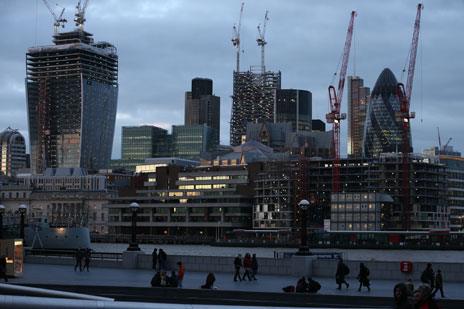How pretty is the UK without the "bad bits"?
- Published
- comments

The City of London: One of the "bad bits"?
One of the things that companies routinely do is state their financial results without the bad bits.
They typically call this presentation "underlying" profit or the profit of "continuing activities".
The respectable reason for showing these figures is that they give shareholders and the world some idea of what the relevant company would look like, once it has chopped out all the rotten bits.
The disreputable reason is that some boards hope that investors will forget that the bad stuff is real, still inside the company, and shrinking the owners' wealth.
You may have noticed, for example, that on the basis of the activities RBS wants to keep, it has been looking in rude health for some years (well almost).
But once the losses on rotten assets are included, bargepoles spring to mind - and for the avoidance of doubt, I am only citing RBS because the scale of the rot it needs to cut out is so great. I am not suggesting it is trying to cynically manipulate perceptions (in fact occasionally I've wondered whether some of its top people actually enjoy wallowing in the red ink they've spilled).
All of which has made me wonder what UK PLC would look like on a "continuing" or "underlying" basis, without the bad stuff?
I am not talking about wishing away the household, business, financial and public sector debt that has been bearing down on economic activity since 2007.
What interests me is what UK output would look like if big sectors in long term decline were excluded.
Here is the thing. For some decades, the British economy has been disproportionately dependent on financial services and North Sea oil and gas extraction - both of which are in serious decline.
Of course not all of the City and finance is shrinking. What has been disappearing is an industry in which we were a world leader - the manufacture of what the FSA chairman, Lord Turner, called socially useless financial products, or the sort of complex derivatives that did the opposite of what they said on the tin (they were supposed to augment investors' wealth, but were a fast route to ruin).
Meanwhile, as banking around the world has reverted to becoming more national and less international again, the City - as the world's most open and global financial centre - has suffered.
Also there are pockets of the North Sea still gushing. And who knows whether, in time, we will become big frackers?
But if we assume that we had too many eggs in the energy and finance baskets, and these sectors will continue to shrink for years as a proportion of the economy, what does the UK look like without them?
Now as it happens, the Treasury has sent me the work it has done on this.
It has adjusted UK gross value added, a measure of economic output, to exclude energy extraction and use, and also financial and insurance activities.
What this shows is that the rest of the economy is in better shape than many might believe, if not in the rudest of health.
So, for example, on the basis of conventional GDP, UK output is still 3% below the peak it hit at the beginning of 2008 (making this, as Stephanie and I have said many times, the longest depression in a technical sense for at least 100 years).
By contrast UK GVA or output without the bad bits, without finance and energy, is almost back to peak output. At the end of 2012, it was 0.7 of a percentage point below its peak in the first quarter of 2008.
That compares well with the euro area as a whole, whose GVA on the same basis is down 2.9 percentage points over the same period.
It is a better performance than the Netherlands and a similar performance to France's. It is miles better than what has happened in the eurozone crisis nations, Italy, Portugal and Spain. And only Germany does a bit better (in its case, output is up by 0.9 of a percentage point).
So on this analysis, UK manufacturing and non-financial services are not doing too badly.
That said, this is not the moment to crack open the champagne.
It is important to remember that the UK has had significant monetary advantages, compared with the more rigid inflexible eurozone, in the post-crash years - a currency, sterling, that could and has fallen to reflect weak conditions here, and a central bank able to price money and create money to meet the UK's challenges.
So British businesses should - and do - perform a good deal better than competitors in countries like Italy and Spain, where the exchange rate and monetary conditions are less accommodating.
Which means there are probably two important points to make. First Britain without the bad bits looks prettier than the eurozone, but uglier than the US.
And unfortunately we can't magic away the bad bits, finance and energy.
They will be with us for years to come, powerful headwinds acting as a brake on recovery.